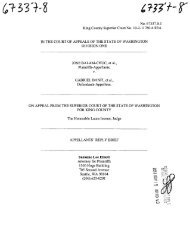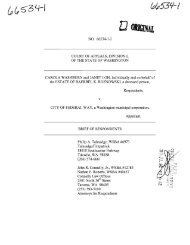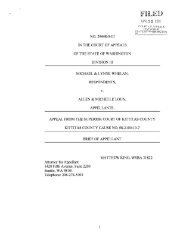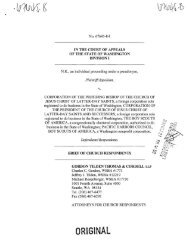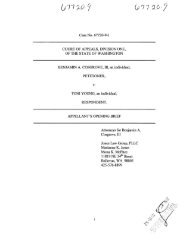Appellant Cross Respondent's Brief - Washington State Courts
Appellant Cross Respondent's Brief - Washington State Courts
Appellant Cross Respondent's Brief - Washington State Courts
You also want an ePaper? Increase the reach of your titles
YUMPU automatically turns print PDFs into web optimized ePapers that Google loves.
COURT OF APPEALS, DIVISION II<br />
OF THE STATE OF WASHINGTON<br />
No. 38354-3-II<br />
Boris Nadein, <strong>Appellant</strong>/<strong>Cross</strong>-respondent<br />
v.<br />
William Turner and Unimak Maritime Group, LLC,<br />
Respondents/<strong>Cross</strong>-appellants<br />
BRIEF OF APPELLANT<br />
ORIGINAL<br />
Bruce Hull, WSBA #18943<br />
Attorney for Boris Nadein, as <strong>Appellant</strong><br />
Law Office of Bruce M. Hull, PLLC<br />
14100 SE 36 th St., Suite 100<br />
Bellevue, W A 98006<br />
(425) 378-8088<br />
Wayne Mitchell<br />
Attorney for Boris Nadein, as <strong>Appellant</strong><br />
Law Offices of Wayne Mitchell, PS<br />
14100 SE 36 th St., Suite 100<br />
Bellevue, W A 98006<br />
(206)-229-7296
TABLE OF CONTENTS<br />
Page(s)<br />
TABLE OF CASES AND OTHER AUTHORITIES .......................... 2<br />
I. INTRODUCTION ......................................................... 4<br />
II. ASSIGNMENTS OF ERROR ........................................... 5<br />
Assignments of Error<br />
No. 1 ............................................................................. 5<br />
No.2 ............................................................................. 5<br />
No. 3: ........................................................................... 5<br />
Issues Pertaining to Assignments of Error<br />
No. 1 ............................................................................. 5<br />
No.2 ............................................................................. 5<br />
No. 3 ............................................................................. 5<br />
No.4 ............................................................................. 6<br />
No. 5 ............................................................................ 6<br />
III. STATEMENT OF THE CASE ........................................... 6<br />
IV. ARGUMENT ............................................................... 9<br />
1. Nadein's Claims Against Unimak Maritime Group Should Not<br />
Have Been Dismissed on Summary Judgment ........................ 9<br />
2. Nadein's Motion to Compel Production ofUMG's Financial<br />
Information Should Not Have Been Denied, Because the<br />
Information Sought Was Relevant to His Damage Claims .......... .l2<br />
APPELLANT OPENING BRIEF-1
3. The Trial Court Should Not Have Excluded Nadein's Accounting<br />
Expert and Directed Verdict on Nadein's Claims Regarding<br />
Conversion of Unimak America Assets ............................... 15<br />
V. CONCLUSION ........................................................... 18<br />
APPELLANT OPENING BRIEF-2
Cases<br />
TABLE OF CASES AND OTHER AUTHORITIES<br />
Barfield v. City of Seattle, 100 Wash.2d 878, 676 P.2d<br />
438 (Wash., 1984) ................................................................ .13<br />
Bushman v. New Holland Division of Sperry Rand Corp., 83 Wash.2d<br />
429,434,518 P.2d 1078 (1974) ................................................ 13<br />
Consulting Overseas Management, Ltd. v. Shtikel, 105 Wash.App. 80, 83,<br />
18 P.3d 1144 (2001) .............................................................. 10<br />
Dennis v. Southworth, 2 Wash.App. 115, 124-125,467 P.2d<br />
330 (1970) ......................................................................... 14<br />
Escalante v. Sentry Ins., 49 Wash.App. 375, 391, 743 P.2d 832 (1987) ... 13<br />
Lang v. Hougan, 136 Wash.App. 708, 150 P.3d 622 (2007), rev. denied<br />
163 Wash.2d 1018, 180 P.3d 1292 (2008) ................................. 10, 11<br />
Lewis River Golfv. O.M. Scott, 120 Wash.2d 712, 717,845 P.2d 987<br />
(1993) ............................................................................... 16<br />
Mohr v. Grant, 153 Wn.2d 812,821, 108 P.3d 768 (2005) ................... 9<br />
Mountain Park Homeowners Ass'n v. Tydings, 125 Wn.2d 337,341,883<br />
P.2d 1383 (1994) .................................................................. 10<br />
Smith v. Kent, 11 Wash.App. 439,449,523 P.2d 446 (1974) overruled on<br />
other grounds ...................................................................... 17<br />
<strong>State</strong> v. Briggs, 55 Wn. App. 44, 58, 76 P.2d 1347 (1989) .................. 17<br />
Taggart v. <strong>State</strong>, 118 Wn.2d 195, 199,822 P.2d 243 (1992) ................ 10<br />
<strong>Washington</strong> St. Bank v. Medalia Healthcare L.L.C., 96 Wash.App. 547,<br />
554,984 P.2d 1041 (1999), review denied, 140 Wash.2d 1007,999 P.2d<br />
1261 (2000) ......................................................................... 10<br />
APPELLANT OPENING BRIEF-3
I. INTRODUCTION<br />
Boris Nadein and William Turner were equal owners ofUnimak<br />
America, a fishing management company. On April 15, 2005, Turner<br />
unilaterally and wrongfully dissolved Unimak America. The following<br />
business day, Monday, April 18, Turner opened Unimak Maritime Group,<br />
LLC ("UMG"), in the same offices and with the same employees (except<br />
for Nadein) as Unimak America. That same day, Turner also signed<br />
contracts between UMG and Unimak America's two biggest customers,<br />
performing virtually the same services for those customers.<br />
Nadein sued Turner and his new company, UMG, for conversion<br />
and breach of fiduciary duty. The trial court dismissed Nadein's claims<br />
against UMG on summary judgment, and refused to permit Nadein to<br />
discover how much money UMG and Turner had made from the Unimak<br />
America customers. At trial, the court found that Turner had converted<br />
Unimak America goodwill without paying any consideration, and<br />
breached his fiduciary duty. However, the court excluded Nadein's<br />
valuation expert, based on the court's own understanding of accounting<br />
principles, and directed verdict against Nadein on that issue. As a result,<br />
Nadein and Unimak America received no consideration for the goodwill<br />
converted by Turner. This appeal follows.<br />
APPELLANT OPENING BRIEF-4
II. ASSIGNMENTS OF ERROR<br />
No.1: The trial court erred in entering its September 22,2006 Order<br />
Granting Unimak Maritime Group's Motion for Summary Judgment.<br />
No.2: The trial court erred in denying Nadein's April 13, 2006 motion to<br />
compel production ofUnimak Maritime Group's financial information.<br />
No.3: The trial court erred in excluding the testimony ofKell Rabem and<br />
subsequently entering the August 22, 2008 judgment in favor of Turner on<br />
Nadein's conversion claim.<br />
Issues Pertaining to Assignments of Error<br />
Issue No.1: Does a claim for conversion lie against a company that<br />
obtains and uses corporate assets that were transferred without authority or<br />
consideration? (Assignment of Error No.1.)<br />
Issue No.2: Is financial information of a company in possession of<br />
converted corporate assets relevant to the amount of conversion damages?<br />
(Assignment of Error No.2.)<br />
Issue No.3: Does the trial court abuse its discretion if it refuses to compel<br />
production of relevant financial information from a defendant.<br />
(Assignment of Error No.2.)<br />
APPELLANT OPENING BRIEF-5
2005, the next business day, he opened a new company, Unimak Maritime<br />
Group, LLC, ("UMG") without Mr. Nadein. (RP 480, lines 11-15.) On<br />
the same day, UMG entered into contracts with Unimak America's two<br />
biggest customers. (RP 487-488.)<br />
B. The Litigation.<br />
Nadein filed suit on April 28, 2005. He asserted claims against<br />
Turner and UMG for conversion, and against Turner for breach of<br />
fiduciary duty. (CP 274-278.) With regard to UMG, it was alleged UMG<br />
took over Unimak America's customers, its good will with vendors and<br />
buyers, and the credit relationships that had been established with<br />
financial institutions and others, without paying any consideration. (CP<br />
99.) Prior to trial, the trial court held the dissolution by Turner was<br />
wrongful and in violation of statute. (CP 127.)<br />
UMG moved for summary judgment dismissal on April 6, 2006.<br />
(CP 1-6.) On April 13, 2006, Nadein moved to compel production of<br />
documents from UMG, including the income and expenses UMG realized<br />
from its business with Rassvet and SRS. (CP 11-19.) The Court denied<br />
Nadein's motion to compel and refused to require UMG to provide any<br />
information except the volume of business done with the two Russian<br />
companies. (CP 94.) The trial court subsequently granted UMG's motion<br />
for summary judgment dismissal. (CP 223-225.)<br />
APPELLANT OPENING BRIEF-7
Trial was set for March, 2007. The remaining defendant, Turner,<br />
moved for summary judgment dismissal which was denied on March 2,<br />
2007. (CP 687-689.) Trial commenced on March 19,2007. Nadein<br />
presented testimony by Kell Rabem regarding the value of the Unimak<br />
America assets, including goodwill, transferred to UMG. He opined that<br />
the value was approximately $836,000. (RP 594 at lines 24-5.) Turner<br />
did not supply any expert testimony regarding the value of the Unimak<br />
America assets.<br />
At the close ofNadein's case, Turner moved for exclusion of Mr.<br />
Rabem's testimony and dismissal ofNadein's claims. His argument was<br />
that Mr. Rabem was not sufficiently familiar with the industry and that he<br />
had failed to take certain alleged evidence into account. (RP 460-462,<br />
59l.)<br />
The trial court held that Turner had transferred Unimak America<br />
goodwill to UMG without consideration. (RP 593, lines 10-14.) The trial<br />
court did not rule that Mr. Rabem was unqualified to give an expert<br />
opinion regard the value of the goodwill. However, the trial court found<br />
fault with the manner in which Rabem calculated the value of the<br />
goodwill. The court questioned the manner in which he allocated assets<br />
and the time period from which he performed his analysis. (RP 597-8.)<br />
The court also criticized his decision to apply a full year of expenses for<br />
APPELLANT OPENING BRIEF-8
2005, when the company ceased operating in April, 2005. (RP 599, lines<br />
1-17.) 1 Turner had no accounting expert, and his counsel raised none of<br />
these issues in his motion to strike. Based on the court's criticism's of Mr.<br />
Rabern's methods, the court excluded Rabern's opinion. (RP 599, lines<br />
18-24.) Without Mr. Rabern, Nadein had no evidence concerning the<br />
value of the Unimak America goodwill converted by Turner, and therefore<br />
could not establish the amount of damages. The trial court granted a<br />
directed verdict in favor of Turner. (ld.) Final judgment was entered on<br />
August 22,2008. (CP 830-831.) Nadein timely appealed.<br />
IV. ARGUMENT<br />
A. Nadein's Claims Against Unimak Maritime Group Should Not<br />
Have Been Dismissed on Summary Judgment.<br />
Nadein's first assignment of error relates to the trial court's<br />
dismissal of his conversion claim against UMG on a motion for summary<br />
judgment. The standard of review for summary judgment dismissals is de<br />
novo. Mohr v. Grant, 153 Wn.2d 812,821, 108 P.3d 768 (2005). The<br />
trial court's summary judgment will only be affirmed if the evidence,<br />
viewed in the light most favorable to the non-moving party, shows that<br />
there is no genuine issue of material fact and that the moving party was<br />
entitled to summary judgment as a matter of law. Id.<br />
1 Of course, using a larger number for expenses would result in a lower<br />
value, which would be an error in Turner's favor.<br />
APPELLANT OPENING BRIEF-9
A motion for summary judgment must be denied if issues of<br />
material fact exist. Mountain Park Homeowners Ass'n v. Tydings, 125<br />
Wn.2d 337,341,883 P.2d 1383 (1994). All facts and reasonable<br />
inferences are considered in the light most favorable to the nonmoving<br />
party, Taggart v. <strong>State</strong>, 118 Wn.2d 195, 199,822 P.2d 243 (1992).<br />
Therefore, if Nadein produced admissible evidence of the elements of his<br />
claims against UMG, the motion to dismiss should have been denied.<br />
"The tort of conversion is 'the act of willfully interfering with any<br />
chattel, without lawful justification, whereby any person entitled thereto is<br />
deprived of the possession of it.'" Consulting Overseas Management, Ltd.<br />
v. Shtikel, 105 Wash.App. 80, 83, 18 P.3d 1144 (2001) (citing<br />
<strong>Washington</strong> St. Bank v. Medalia Healthcare L.L.C., 96 Wash.App. 547,<br />
554,984 P.2d 1041 (1999), review denied, 140 Wash.2d 1007,999 P.2d<br />
1261 (2000». Nadein contends UMG wrongfully interfered with Unimak<br />
America assets, used those assets and deprived Unimak America of its<br />
rightful possession.<br />
This case is controlled by Lang v. Hougan, 136 Wash.App. 708,<br />
150 P.3d 622 (2007), rev. denied 163 Wash.2d 1018, 180 P.3d 1292<br />
(2008). The facts in Lang are strikingly similar. Lang involved two equal<br />
owners of a corporation involved in real property management. Following<br />
deterioration of the parties' relationship, Hougan formed a new company<br />
APPELLANT OPENING BRIEF-lO
and solicited the existing clients. Lang sued Hougan and her new<br />
company, alleging conversion of corporate goodwill and breach of<br />
fiduciary duty. The trial court held that Hougan was not guilty of breach<br />
of fiduciary duty and conversion. The Court of Appeals held that the<br />
customers were part of the goodwill of the existing corporation, and that<br />
Hougan's unilateral solicitation of the customers without consideration<br />
gave rise to claims for conversion and breach of her fiduciary duty.<br />
In this case, Turner unilaterally dissolved Unimak America, and<br />
began UMG the following business day, in the same offices, and serving<br />
the same two main customers as Unimak America. At trial, the trial court<br />
held that the customers were part of the good will of Unimak America and<br />
that no consideration had been paid. This is virtually identical to the facts<br />
in Lang.<br />
UMG premised its motion for summary judgment on the argument<br />
that UMG could not be subject to successor liability, because it took only<br />
the assets, but not the liabilities of Unimak America. But this argument<br />
does not address plaintiff's actual claim, that UMG converted Unimak<br />
America assets without paying any consideration. The fact that Turner<br />
actually transferred the good will is irrelevant. UMG, through its principal<br />
Turner, was aware of the circumstances of the transfer. Under Lang, the<br />
APPELLANT OPENING BRIEF-II
trial court's dismissal ofUMG on summary judgment was error and<br />
should be reversed.<br />
B. Nadein's Motion to Compel Production ofUMG's Financial<br />
Information Should Not Have Been Denied, Because the<br />
Information Sought Was Relevant to His Damage Claims.<br />
Nadein's second assigned error is the trial court's denial of<br />
Nadein's motion to compel production of UMG financial records and<br />
information. The trial court refused to permit Nadein to discover financial<br />
information from UMG that would have permitted him to determine the<br />
profits UMG obtained from using Unimak America's assets.<br />
Plaintiff requested in discovery that UMG "Identify all financial<br />
statements, tax returns, trial balances, profit loss statements, cash flow<br />
statements, financial statements, general ledgers and budgets of Unimak<br />
Maritime Group, LLC." and "Please produce each and every document<br />
identified your answer to Interrogatory No. 38 above." (CP 81-82.)<br />
Plaintiffs also sought additional information about UMG's relationships<br />
with Unimak America's customers and suppliers. (CP 79-81.) Turner and<br />
UMG objected to the requests and refused to produce the requested<br />
information. (CP 79-82.)<br />
On April 13, 2006, plaintiff brought a motion to compel production<br />
of documents and information from UMG. The trial court granted<br />
plaintiffs motion only in part. The Court restricted discovery against<br />
APPELLANT OPENING BRIEF-12
UMG to "the following concerning its clients in common with Unimak<br />
America; any agreements, the volume of business, all communications<br />
between UMG and those clients related to the changeover from UA and<br />
UMG". (CP 94.) The trial court ruled that Nadein's requests were<br />
otherwise overbroad, and refused to compel production of further UMG<br />
financial information. (Id.)<br />
The standard of review on the trial court's denial of a motion to<br />
compel discovery is abuse of discretion. Barfield v. City of Seattle, 100<br />
Wash.2d 878,887,676 P.2d 438 (Wash.,1984). If facts and documents<br />
sought are relevant to an action and discoverable under the rules of Civil<br />
Procedure, the trial court abuses its discretion in denying a motion to<br />
compel discovery. Escalante v. Sentry Ins., 49 Wash.App. 375, 391, 743<br />
P.2d 832 (1987) overruled on other grounds.<br />
The scope of discovery is broad.<br />
The only limitation is relevancy to the subject matter<br />
involved in the action, not to the precise issues framed by<br />
the pleadings, and inquiry as to any matter which is or may<br />
become relevant to the subject matter of the action should<br />
be allowed, subject only to the objection of privilege. The<br />
test in determining relevancy of interrogatories is whether<br />
the testimony sought may reasonably be expected to lead to<br />
the discovery of admissible evidence.<br />
Bushman v. New Holland Division of Sperry Rand Corp., 83 Wash.2d<br />
429,434,518 P.2d 1078 (1974) (citations omitted.) It is apparent that the<br />
APPELLANT OPENING BRIEF-13
profits obtained by UMG using the Unimak America assets would be<br />
extremely relevant in this action, especially since Nadein's case foundered<br />
on his inability to establish the value of the assets converted by Turner and<br />
UMG. The information could also be relevant to Nadein's claims that<br />
Turner was improperly paying third parties for services that were never<br />
performed. If UMG made no payments to those entities and showed<br />
significantly higher profits as a result, it would raise an inference that the<br />
payments were not legitimate.<br />
As a result of the court's ruling, Nadein was denied access to<br />
UMG's financial information, from which he could have determined the<br />
profits UMG had realized from the Unimak America assets, including<br />
goodwill, that were converted. Damages for loss of profits due to loss of<br />
converted property can be recovered by a successful claimant. Dennis v.<br />
Southworth, 2 Wash.App. 115, 124-125,467 P.2d 330 (1970).<br />
This argument was put squarely before the trial court by Nadein:<br />
Financial information is obviously relevant to damages, as<br />
plaintiff contends UMG converted Unimak America assets,<br />
including good will. The income realized from the Unimak<br />
America assets is relevant to the value of the assets<br />
converted.<br />
(CP 17.) By denying Nadein access to UMG's financial records, the trial<br />
court prevented him from obtaining information highly relevant to the<br />
issue of damages. As a result, Nadein's only avenue for proving his<br />
APPELLANT OPENING BRIEF-14
damages was to project the value of the goodwill based on Unimak<br />
America's historical income from those clients. When the trial court<br />
rejected this approach, Nadein was unable to establish the value of the<br />
converted Unimak America assets and his claim was dismissed. The trial<br />
court's refusal to compel production of this information was an abuse of<br />
discretion and should be reversed.<br />
C. The Trial Court Should Not Have Excluded Nadein's<br />
Accounting Expert and Directed Verdict on Nadein's Claims<br />
Regarding Conversion of U nimak America Assets.<br />
Nadein's third assignment of error is the trial court's decision to<br />
exclude accounting expert Kell Rabern's opinion as to the value of the<br />
goodwill taken by Turner, which resulted in a directed verdict because<br />
N adein had no evidence supporting the amount of his damages. As an<br />
initial matter, if the Court agrees to grant a new trial based on the first two<br />
errors identified, this error is superfluous. However, it was an additional<br />
error that also supports Nadein's right to remand for a new trial.<br />
At the close ofNadein's case, Turner moved for a directed verdict<br />
on the issues of conversion and breach of fiduciary duty. The trial court<br />
ruled that under the applicable standard, Nadein had provided evidence<br />
sufficient to establish that Turner had converted Unimak America assets<br />
and breached his fiduciary duty. (RP 593, lines 9-14.) However, the trial<br />
court found fault with the methods used by Nadein's accounting expert,<br />
APPELLANT OPENING BRIEF-IS
Kell Rabern, and excluded his valuation of goodwill. Without this<br />
valuation 2 , Nadein had no evidence concerning the value of the Unimak<br />
America assets that were converted by Turner. The Court therefore<br />
dismissed Nadein's claims for conversion and breach of fiduciary duty as<br />
a matter of law.<br />
Nadein was obviously damaged by Turner's wrongful dissolution<br />
ofUnimak America and diversion of its assets to UMG. Prior to this<br />
action, Nadein was receiving income, afterward he was not. (CP 130.)<br />
"[O]nce the buyer establishes the/act ofloss with certainty (by a<br />
preponderance of the evidence), uncertainty regarding the amount of loss<br />
will not prevent recovery." Lewis River Golfv. O.M. Scott, 120 Wash.2d<br />
712, 717, 845 P.2d 987 (1993). The court stated:<br />
With respect to loss of goodwill, proving damages with<br />
reasonable certainty should track the generally expansive<br />
recent history of lost profits. However, unlike lost profits,<br />
goodwill relates to the future and, thus, no actual profit<br />
base will exist for use at trial. Accordingly, the expert<br />
testimony of accountants and economists will prove<br />
invaluable to the aggrieved buyer in presenting his claim<br />
for loss of goodwill. Such testimony will generally be<br />
accepted by the courts in assessing goodwill claims.<br />
Id. at 718. (Emphasis in original.) This is precisely the type of testimony<br />
the trial court rejected here.<br />
2 And without access to the profits made by UMG from the converted<br />
Unimak America assets, supra.<br />
APPELLANT OPENING BRIEF-16
The basis of the trial court's ruling was its own independent<br />
analysis of Rabem's testimony. (RP 595 - 599.) The criticisms raised by<br />
the trial court to support the exclusion were not raised by Turner. No<br />
expert testimony was introduced to rebut Rabem or support the court's<br />
conclusions. Instead, after Nadein rested, the trial court decided,<br />
apparently based on its own knowledge of accounting, that Rabem's<br />
methods were based on speculation and inappropriate methodology. (RP<br />
599.)<br />
Nadein had no opportunity to rebut the trial court's observations.<br />
Rabem could not be asked to respond to these criticisms, or to address<br />
how using another method would affect his results. For example, he did<br />
not have the opportunity to point out that using $500,000 as the operating<br />
expense for 2005, instead of a smaller number as suggested by the court<br />
because Unimak America closed in April, meant that Rabem arrived at a<br />
lower damage figure. In a jury trial, a new trial is warranted when the<br />
finder of fact introduces specialized knowledge in deliberations, that is the<br />
subject of expert testimony. <strong>State</strong> v. Briggs, 55 Wn. App. 44, 58, 76 P.2d<br />
1347 (1989). See, e.g., Smith v. Kent, 11 Wash.App. 439, 449, 523 P.2d<br />
446 (1974) overruled on other grounds. (prejudice established when juror<br />
referred to his truck driving experience in deliberations to support his<br />
conclusion that defendant's theory was correct.) The trial court here<br />
APPELLANT OPENING BRIEF-17
.J ,-<br />
Marc Barreca<br />
K& L Gates<br />
925 4th Ave., Suite 2900<br />
Seattle, WA 98104<br />
Dated this 8th day of April 2009.<br />
1!.J#JlJiM6£47<br />
Attorneys for <strong>Appellant</strong> Boris A. Nadein



